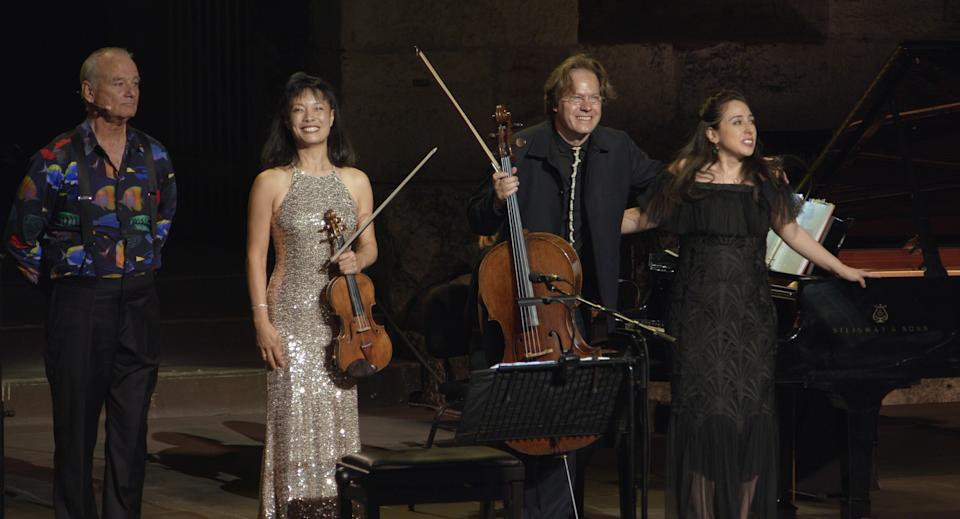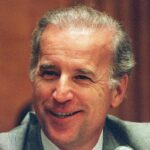For decades now, moviegoers have watched Bill Murray hunt gophers, bust ghosts and befriend groundhogs. But you’ve never seen the actor and comedy legend take on a role like the one he has in New Worlds: The Cradle of Civilization. Premiering in theaters on, appropriately enough, Groundhog Day, the film preserves the final performance in the 2018 New Worlds global tour — inspired by the 2017 album — that sent Murray across the world as the emcee of a quartet of great music and literature aficionados. “We ended up, the four of us, doing this great music and this great literature all over the world,” he tells Yahoo Entertainment now. “We were feeling like we were actual receivers and transmitters of something.” (Watch our video interview above.)
Murray’s traveling companions on the New Worlds tour included cellist Jan Vogler, violinist Mira Wang and pianist Vanessa Perez. Touching down in such far-flung cities as Houston, Toronto, Sydney and Athens — where The Cradle of Civilization was filmed — the four put on command performances that mixed classical music and classic rock with readings from the works of authors and poets like Ernest Hemingway and Walt Whitman. That roll call may sound more like homework than entertainment, but Murray and his collaborators made sure the mood was anything but stuffy.
“What we wanted to do was really create a show,” Vogler says. “This is not a concert, and this is not one of those dreadful readings where an actor reads, let’s say, the letters of Plato while somebody plays classical music. We wanted to entertain and we wanted to really create something that’s never really been seen.” For his part, New Worlds director Andrew Muscato — who filmed the tour’s closing night performance in Athens — said that the mood inside the Odeon of Herodes Atticus amphitheater that evening was closer to a “rock concert” than a study session. “My goal [as a director] was to get out of the way … and really feel the emotion of the pieces that they’re playing.”
One author whose words you won’t hear in the film version of New Worlds is Mark Twain. Both the album and the live show feature a 15-minute segment in which Murray reads aloud from Twain’s seminal novel, The Adventures of Huckleberry Finn, backed by Vogler’s instrumental performance of Henry Mancini’s “Moon River,” made famous by Breakfast at Tiffany’s. The actor says that the length of the piece is the main reason it was dropped from the movie. “It was two pieces together: a many-minute reading of the most beautiful sequence from Huckleberry Finn … tied to ‘Moon River,'” he notes. “It was beautiful to read and it was beautiful to hear [Jan] play ‘Moon River’ on the cello.”
Of course, it’s not lost on Murray that Huckleberry Finn is a divisive work, one that’s been banned numerous times since its initial publication in 1884 for its frank depictions of 19th century racism and uncomfortable language, including frequent use of the “N” word. And the book’s place in the canon of American literature remains just as controversial today, at a time when there’s been a noticeable surge in book censorship around the country. Murray expresses little patience for critics who would prefer to see Huckleberry Finn vanish into the past. “Critics can and have been wrong from the beginning of time,” he says. “Opinions are like nostrils: Everybody has two.”
“I think that this particular segment of Huckleberry Finn is incredibly realistic and very honest,” Murray continues, referring to his selected passage from Twain’s book. (You can hear his full reading on the New Worlds album.) An excerpt from the 16th chapter, the portion finds Huck wrestling with whether or not to help the runaway slave, Jim, escape to freedom. “What you get is the reward of someone’s humanity that supersedes public opinion. The spirit and the decency of Huckleberry Finn comes out — the decency of a human being comes out in the face of possible death. Huckleberry Finn is a hero to me. He’s many things, as we all are, and in that moment he’s his best, his very best. God bless him.”
Another one of Murray’s heroes that did make the final cut of The Cradle of Civilization is the celebrated Black poet, Lucille Clifton. The actor describes the experience of discovering her Pulitzer Prize-nominated work — including “Blessing the Boats,” which he reads in the film — as a “slap in the face.” (Clifton died in 2010.) “It was like these doors of ignorance fell down around me, and made me more courageous to read it each and every night,” explains the avowed poetry fan and frequent participant in New York City’s annual Poetry Walk. “I knew that I had to speak her words and put them up there as far as I could get them.”
It should be noted that the New Worlds tour didn’t just call on Murray to read — he also sings and dances throughout the two hour show, covering everything from show tunes (including a medley of West Side Story favorites) to gravelly-voiced anthems by the likes of Van Morrison and Tom Waits. And watching the actor lose himself in the emotion of each and every song is one of the pleasures of the film. Midway through The Cradle of Civilization, Murray croons a version of Stephen Foster’s “Jeanie With the Light Brown Hair” that’s so hauntingly intimate, it feels like he’s singing to a real Jeanie.
“Very right of you to notice that,” he confirms. “It is a very personal song, and that made it a source for me. I was able to do it each night and bring deeper and deeper levels of feeling to it. I wasn’t faking it.”
Murray also wasn’t faking the very real rage he brought to his rendition of Bruce Hornsby’s 1986 rock favorite, “The Way It Is.” Directly inspired by the Civil Rights movement, the actor felt that the song gained new resonance in 2018, when some of the same racial and socioeconomic inequities had resurfaced around the world.
“That’s the point in the show where we needed to have a popular song,” Murray explains, remembering how audiences flipped out when they heard the song’s familiar opening piano chords. “The rage of it is so diminished [now], and I thought, ‘Why don’t I just act out a little bit. What Bruce would say in his own room after a little bourbon?’ It was time to cover this baby a little differently.”
Moscato remembers Murray’s interpretation of a familiar American rock staple translating well to the largely Greek audience. “Even though the song is about the Voting Rights Act and the Civil Rights movement, it really spoke to the Greeks, who had been through this economic trouble and the notion that they were living in a corrupt country. After the show, a lot of my Greek friends told me how they really took that song to heart. That’s the power of the New Worlds show: it’s entertainment with a lot of meaning behind it.”
The filmed version of New Worlds should prove extra-meaningful for those audiences who have missed the energy of live concerts during the ongoing COVID-19 pandemic. With in-person events now starting to return, Murray and Vogler aren’t ruling out a return to the stage. “It’s really box office driven,” the actor jokes. “There’s a certain number that we have to get to, and that’s why we’re working so hard to get people excited. What is that number again? I think it’s $715. If can get to $715, the band’s getting back together.” Like the song goes, that’s just the way it is.
— Video produced by Anne Lilburn and edited by John Santo
New Worlds: The Cradle of Civilization premieres Wednesday, Feb. 2 in theaters.




